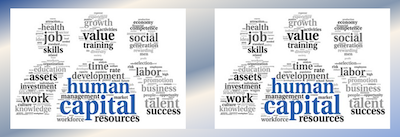Managing Your Team and Career Through Today’s ‘New’ Economic Realities – Part I

Most of today’s business leaders are experiencing a convergence of economic events unprecedented during their careers.
Increasing interest rates, low unemployment, the most transient workforce in 50 years, a complete rethinking of where we work from, and a plethora of technology choices are overwhelming finance leaders and their teams. This comes on top supply chain disruptions that have whipsawed the price of inputs making margins unpredictable for many businesses. In this 3 part series we will share 6 topics that will help you navigate the new waters of today’s economy.
The topics include People, Leadership, Profitability, Funding, Technology and Your Professional Growth. We will include actions finance leaders can take to thrive in an environment where others are trying to survive.
Let’s start with People and Leadership.
People:
The role of the finance leader is rapidly becoming more about people than it is numbers. With quit rates higher than at any time in the past 50 years developing an engaged workforce is critical to stopping the exodus. According to Gallup’s 2022 report on the State of the Global Workplace, employee stress is 42% higher than it was in 2009.* Finance leaders are turning their resources to understanding what is driving these results and how can they be reversed. This effort starts by measuring retention rates, calculating recruiting and on-boarding costs and determining the ROI on the investments you are making in the professional development of your team.
Kevyn Rustici highlights these changes in this video, CFO Talk: People Focused Finance with Kevyn Rustici
Talent (human capital) measurement is the new frontier of finance. The measures noted in the previous paragraph form a baseline for comparison to history, your industry and the expectations of the Board and management. Treating Human Capital as an asset to be invested in can facilitate HC-related spending decisions. The challenge is determining, with reliability and validity, the measures of cost and “value” (or benefit) derived from each activity/investment undertaken by the firm. A recent function to benefit from the rigor of data analytics is the Human Capital function. Almost every Human Capital process and human resources program can be evaluated using the bottom-line-focused rigor of utility analysis to make informed investment decisions.
Future employee-focused programs and processes should be viewed through this “utility” filter and offer insight by focusing on the success of a specific program against its stated goals (benefits, training, recruitment, bonuses, and more) and contribution to economic value creation. Our profession is making good progress in this area. Here is an example with some great lessons from Dr. Solange Charas, Human Capital As A Company Asset: Applying Utility Analysis.

Coaches aren’t just for athletes anymore. As the role of the senior finance officer evolves and the dynamic world of business globalizes, the idea and scope of coaching has broadened. Through its Insight series, the ACCA made the following observations on coaching in its research paper, The Coaching and Mentoring Revolution – Is It Working?:
- Assessment, guidance, advice and possibly instruction are key activities in the coaching role.
- Coaching is about enhanced performance and must therefore be planned and monitored and tested for effectiveness.
- The coach is a key resource for the finance professional who wants to learn from the best.
A global survey conducted by an international accounting organization revealed that 87 percent of respondents believe their organizations could benefit by providing coaching for their finance professionals. Included in this group is the most senior financial professional at these companies - from CFOs at larger firms to Controllers or Accounting Managers at smaller companies.
If you don’t have a formal coaching program at your company, consider putting in some type of mentoring program to improve your professional development program and the performance and retention benefit that will accrue from it.
Garner some great professional development ideas from Coaching for Senior Finance Leaders: Invest in Yourself and Your Company
Leadership:
Finance leaders and their teams are relied on to be resilient, dependable and prepared to tackle a crisis. How prepared is your organization to address the challenges of today’s economic environment? The principal drivers that make companies resilient include:
- Margin Protection – protecting EBITDA margins through divestitures of low-margin offerings – pruning under-performing products and services while identifying acquisitions that bring higher margins and cost management.
- Revenue Growth – achieving revenue growth during the downturn by focusing on strategic pricing and high-margin offerings. Focusing effort on those products and services that address unmet needs by competitors that would justify price increases — this focus ensures that margin protection is obtained through revenue growth rather than cost reduction.
- Stockpiling Retained Earnings – building a war chest of retained earnings in support of reinvestment opportunities in high-margin acquisitions.
One of the first steps finance leaders and their team should be taking is to understand the financial well-being of the enterprise by performing a profitability cost analysis on for-profit companies or spending in public-sector and non-profit organizations. Creating Resilience In Finance - Part I, is a four part series by Brian Higgins which addresses many of the issues finance leaders face in this area.
Frequently, traditional costing tools and ERP systems make this difficult or even misleading. Know the shortcomings of your costing tools and ERP system and plan accordingly. Peter Adams tackles these shortcomings in, Six Signs Your Company Needs ERP Therapy

Creating a successful work from home environments means doing your homework. A survey conducted by CFO.University with nearly 200 global finance leaders indicated 58% estimated time savings of one hour or more each day by working from home. Another 20% claimed savings between 31-60 minutes. The vast majority of the remaining 22% were back in the office full time.
Here are details from the survey, Over 50% of Finance Leaders Save an Hour or More Per Day by Working From Home
The challenge finance leaders face is how to address the shortcomings of working from home with the overwhelming benefits employees indicate they are experiencing from the flexibility and time savings working from home gives them. Corporate culture and attitudes will play huge roles in how companies take advantage of this opportunity. Our bias today is that many business models can adapt to a Live Anywhere, Work Everywhere perspective that will benefit the highest caliber professionals and the most flexible employers.
To be effective finance chiefs, CFOs must be well rounded business executives. There are three key areas CFOs and other finance leaders should focus on to grow their leadership skills – business acumen, tools/techniques and behavioural skills.
Business acumen are skills that can be both intentionally learned and practiced. They include the following examples:
- Business strategy development
- The purpose and role of business functions
- Strategic performance management techniques
- Financial acumen (which all qualified accountants should already have)
- Concepts of marketing and sales
- Concepts of supply chain, manufacturing and logistics The technical skills involve business performance management.
Tools and techniques include the skills involved in business performance management. They are all about the tools that help us manage performance. Examples include:
- Key Performance Indicators
- Costing systems
- Product/Customer Profitability Analysis
- Forecasting
- Financial modelling
- Data Management & Analytics
- Data mining and query building
- Dashboards and data visualization techniques
Behavioral skills broadly relate to the way we do things or the way we relate to other people in our daily lives. Examples include:
- Coaching
- Building relationships
- Communication
- Listening and questioning
- Presenting
- Influencing
- Negotiation
- Leadership
Take inventory of the bullet points above to determine what you should focusing on to be a well-rounded business executive. Andy Burrows does a wonderful job explaining these in, If You Want To Be A CFO, Develop These Three Skills

CEOs and Boards lean heavily on the CFO during a crisis. Companies find themselves in “crisis” more often than we like to admit. Some crises are specific to our company. Some are specific to our industry. Others to the geography we operate in. And, some, like the recent pandemic are global in nature. It doesn’t matter how specific or how broad the crisis, CFOs have a critical role in navigating their company through the rough waters caused by the disruption.
There are four areas for CFOs to focus on in any crisis.
1. People come first. Answering these questions are big steps in making sure we keep people first in our crisis management plan.
- How are different stakeholders likely to be affected?
- What can we do to protect each group of stakeholders?
- How to implement and communicate the stakeholder protections?
2. Lead the risk management and mitigation of the crisis at hand. A CFOs deep understanding of the business and ability to convert that understanding into financial outcomes sets us apart when it comes to assessing the potential business impact of a crisis.
3. Ensure liquidity is available for the worst-case scenario. Back-up lines of credit, cash reserves and contract terms with customers, suppliers and unions can all play a role in maintaining corporate liquidity. A 13-week cash flow forecast is good to have as a standard report and essential during a crisis. Prepare an asset liquidation schedule that highlights the most liquid unencumbered assets, their expected liquidation value and time frame to convert to cash.

4. Once a liquidity strategy is in place, a margin management plan using the current supply and demand expectations is an essential component of the CFO’s role. An updated earnings forecast incorporating new volumes, prices, cost of goods and overheads will help the team get their arms around the impact of the crisis and identify the levers that need to be pulled for business sustainability.
Effectively managing these four areas before a crisis hits will put you in great position to recover quickly, incur less ‘pain’ and take advantage of the opportunities a crisis can provide. Learn more about the The CFO’s Role in Times of Crisis.

Focusing on people and leadership are a winning combination for finance leaders during this time of unprecedented change.
Here is the link to Part II of Managing Your Team and Career Through Today’s ‘New’ Economic Realities.
*State of the Global Workplace 2022 Report, Gallup
Identify your path to CFO success by taking our CFO Readiness Assessmentᵀᴹ.
Become a Member today and get 30% off on-demand courses and tools!
For the most up to date and relevant accounting, finance, treasury and leadership headlines all in one place subscribe to The Balanced Digest.
Follow us on Linkedin!
